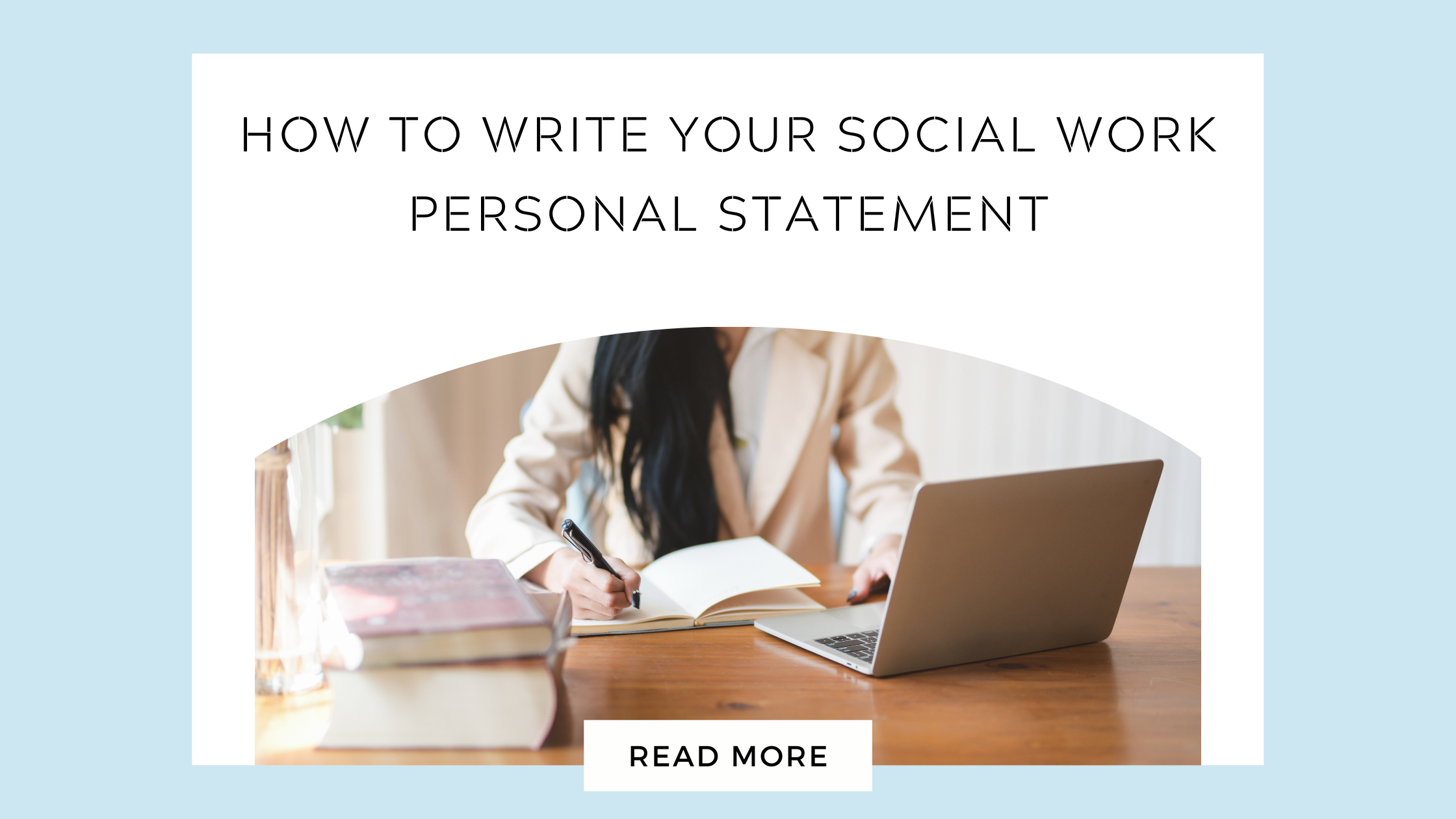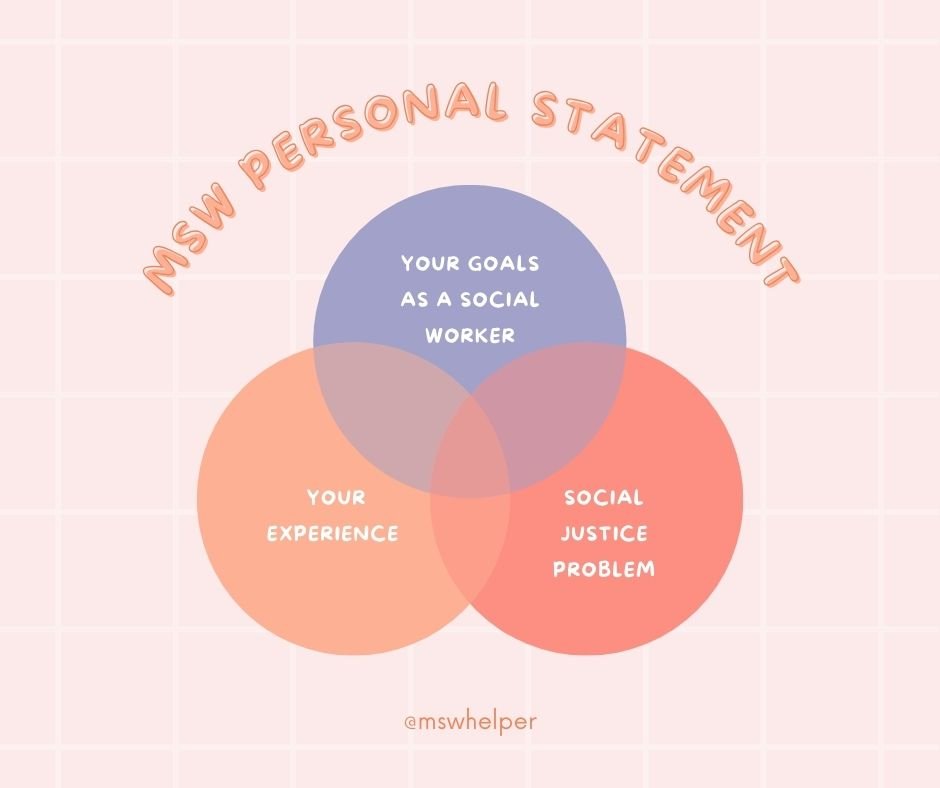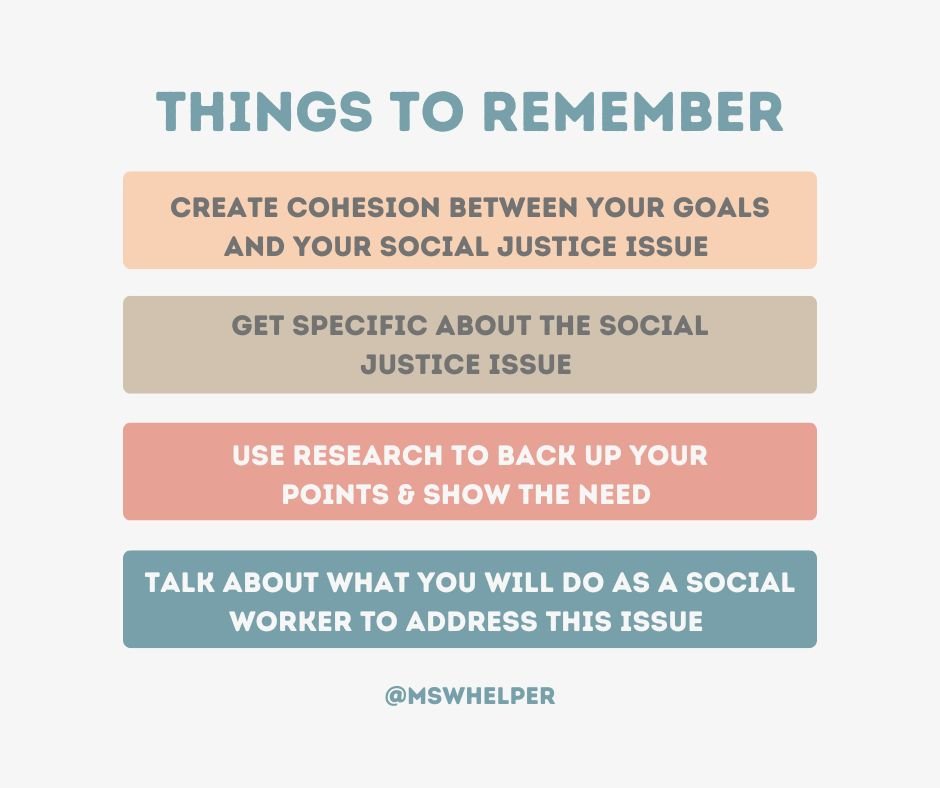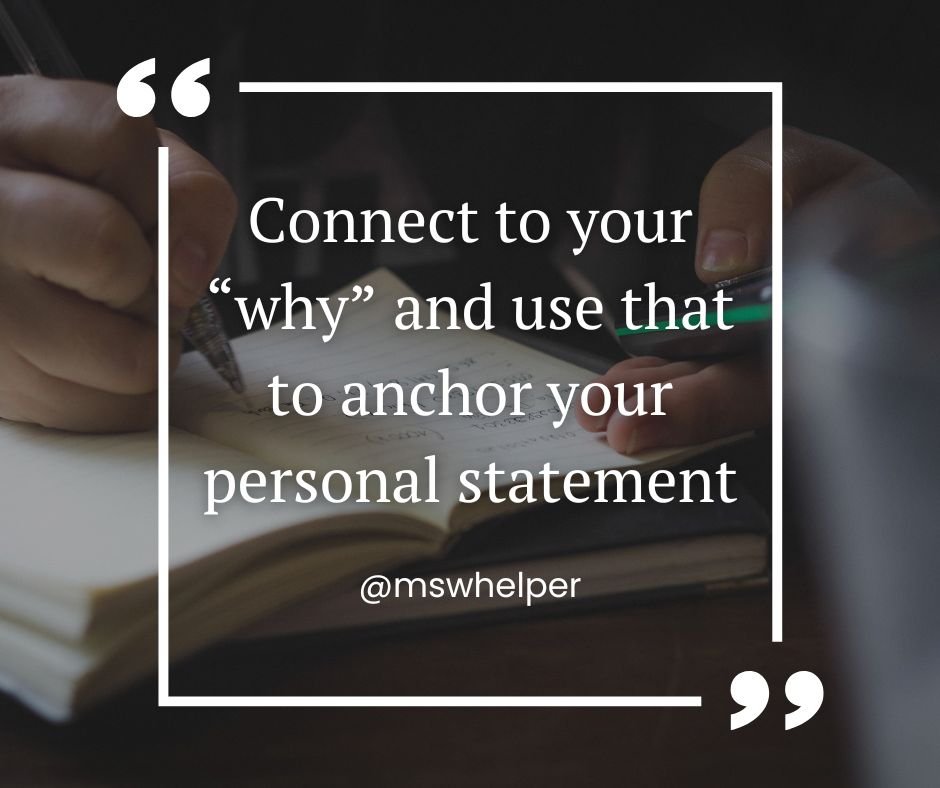How to write your social work personal statement
Applying to your Master of Social Work (MSW) is a huge step in your career to becoming a social worker. MSW applications are holistic, meaning they look at many parts of you when considering your applications. Most MSW admissions committees make decisions based on applicant transcripts, resumes, references, and the personal statement.
A personal statement is a written work where you discuss your motivations for becoming a social worker. Although they vary from school to school, most schools ask you to discuss your personal and professional aspirations, your goals, and your understanding of social justice issues and values of the social work profession.
Your personal statement is one of the most important documents that you’ll write in your career, yet there are few resources that explain how to write an impactful personal statement. In this article, we will be talking about what you should include in your social work personal statement, as well as mistakes to avoid.
What should be included in a personal statement for social work?
When starting to put together your personal statement, it’s important to make note of what each school is looking for. Most schools will provide instructions or guidelines about what they are looking for. Although there are variations from school to school, the vast majority of schools ask about the following in the personal statement:
Your experiences (from your life, professional experiences, schooling, etc).
A discussion of a social problem and how social workers can work towards solving it.
Your goals as a social worker
In addition, most schools of social work are assessing your personal statement for the following:
· Your ability to communicate clearly and succinctly
· Evidence of critical and analytical thinking
· Potential contribution to practice in an area of interest
· Complement between social work and the applicant's professional goals and interests
Talking about personal and professional experiences in the social work personal statement
To start your personal statement, I recommend listing out all of your personal and professional experiences. This can include hardships you’ve experienced, work, volunteer, and internship experience, and academic experiences.
Then, think about why those experiences motivated you to pursue a Master of Social Work. What insights did you gain from those experiences, and what were the most powerful experiences that led you to a career in social work?
Avoid simply talking about your job duties, and focus on the insights you gained. For example, an applicant who works at a women’s shelter may have had realizations about housing inequality or barriers women who experience domestic violence face.
If you don’t have direct practice experience, don’t discount the insights and skills you would have gained in your “non-social work” roles. For example, when I worked as a camp counsellor I realized that I preferred working 1:1 to leading an entire group, which is what motivated me to become a social worker instead of a teacher.
Many MSW applicants pursue a career in social work because of personal hardships they experienced. Schools of Social Work know that this is an important consideration, so they leave space for applicants to discuss this. Discussing your own experiences is 100% optional, and you should only include it if it actually is part of the reason why you wish to pursue a career in social work. (In other words, don’t include it simply because you think it’ll give you brownie points.)
The social justice problem in the social work personal statement
Many schools ask applicants to discuss a social justice problem in their personal statement. Schools are looking for your alignment with social work values, critical thinking skills, and potential contribution to the field.
When picking a social justice problem, you should pick something related to your own experiences and goals as a social worker. For example, if you’re goal is to work with kids, you should pick a social justice issue that has to do with kids.
When applicants discuss a social justice issue that has nothing to do with their own insights, experiences, and goals, it creates a confusing personal statement and makes it unclear why applicants are interested in pursuing an MSW.
It’s also important to get specific about your social justice issue. When you discuss a social justice issue based on your own personal and professional experiences, it makes it much easier to get specific. For example, instead of talking about overarching issues such as racism, sexism, or poverty, try to dig a bit deeper. You might talk about how your own experiences in therapy as an immigrant in the USA negatively impacted your mental health. In your social justice issue, you could talk about how therapy is dominated by white, westernized clinicians, and how this can lead to poor outcomes for minorities and immigrants.
Finally, you should always use research to back up your points and insights. This is something many applicants don’t think to do, but adding research to back up your points shows the reader your critical thinking skills and academic writing abilities. It’s not a research paper, so don’t let the research overtake your personal statement, but adding a statistic or research can strengthen your points.
When writing a personal statement it can be helpful to integrate social work lingo. Click here to get a free copy of the social work buzzword checklist for your personal statement.
Your goal as a social worker
Finally, connect your insights derived from your personal and professional experiences, and your social justice issue by talking about your goals.
When talking about what role social workers can have in solving your social justice issue, talk about how YOU will work towards solving the social justice issue as a social worker. What skills, insights, or experience do you have that make you the right person to work toward solving this social justice issue?
By connecting your insights to your social justice issue, and ultimately your goals as a social worker, you prove to the admissions committee that you would make a valuable contribution to the field, and that accepting you to the program is a no-brainer.
How should I start my Master's personal statement?
To start your personal statement, think about your “why”.
Why do you want to be a social worker? Who do you want to help, and in what capacity?
There are many different types of social workers, and social workers work in many capacities at the micro, mezzo, and macro level.
It’s important to be specific about why you want to be a social worker, and go deeper than saying you simply want to help people. (Because if you simply wanted to help people, why not join another helping profession, such as nursing or law.)
In addition to your why, think about why social work is the right field for you. How do you align with the values of the social work profession? You may want to look up social work theories to guide you.
Develop a mission statement for your personal statement
Now that you’ve uncovered your insights, skills, goals, and your why, I highly recommend developing a mission statement (otherwise known as a thesis statement/elevator pitch) for your personal statement.
Developing a mission statement is a great way to anchor your personal statement. It will keep you accountable and focused as you write, and it provides a summary for the reader.
Developing a mission statement is a great way to anchor your personal statement. It will keep you accountable and focused as you write, and it provides a summary for the reader.
You should always include your mission statement in the introduction and conclusion of your personal statement. Admissions committees read hundreds of personal statements each year, so it’s likely that they do a lot of skimming. By adding a concise mission statement you’ll tell the reader everything they need to know about you.
Your mission statement should include an overview of your experience, goals, and potential to contribute to the field of social work in a meaningful way.
In the Social Work Personal Statement Writing Workshop, we help you develop a strong mission statement to anchor your writing.
What should a statement of purpose look like?
When writing your statement of purpose, you should always write it in an essay format. The reason for this is that the personal statement also serves as a sample of your academic writing abilities, so making an extra effort to show the reader your abilities can really stand out. For that reason, I suggest avoiding writing your personal statement in the form of a letter.
I also recommend formatting your personal statement in APA format, since this is the format Schools of Social Work often use. Using proper APA formatting gives your personal statement a professional edge and shows the reader your academic writing abilities. Read this article to learn how to write a personal statement in APA format.
How long should a personal statement be?
Most personal statements are between 500-2500 words, or 2-5 pages double-spaced.
The length of your personal statement depends on the school. Most personal statements are between 500-2500 words, or 2-5 pages double-spaced.
You should always aim to be close to the word/page limit. If your personal statement is much shorter than the maximum length, you might be missing important information. You should also be sure not to go over the word/page limit.
If you are struggling to be concise or properly format your personal statement our team of MSW Application Advisors can help you meet the requirements of your school and edit your personal statement.
What should you avoid in your personal statement?
Avoid saying you want to help people: As mentioned, when writing a social work personal statement, it’s important to get specific about why you want to be a social worker. By getting specific you’ll stand out and show the admissions committees your alignment and potential to contribute to the social work field in a meaningful way.
Make sure your personal statement is organized: Admissions committees read many personal statements each application season, so it’s important that your personal statement is organized and easy to read. You can do this by including a mission statement in your introduction and conclusion, as well as separating your prompts with headings, so that the reader can easily see that you answered all of the questions.
Be sure to follow guidelines and answer all prompts: Make sure you follow any instructions to a tee. Failing to listen to instructions, such as page limits or formatting requirements, is an easy way for admissions committees to weed out your application. Also, make sure that you fully answer each prompt. Many applicants make the mistake of not fully reading the prompts, and as a result they miss out on answering important questions.
As part of our social work personal statement editing services, we cross reference your personal statement with your school's application requirements, and ensure that your personal statement is answered fully and follows all best practices.
What is an example of an MSW statement of purpose?
Hopefully, by now, you have some ideas about how to start your personal statement and mistakes to avoid. The Social Work Personal Statement Template was designed to help you uncover your insights, goals, and why for pursuing social work. It also includes examples of an MSW statement of purpose to help guide you in the writing process.







